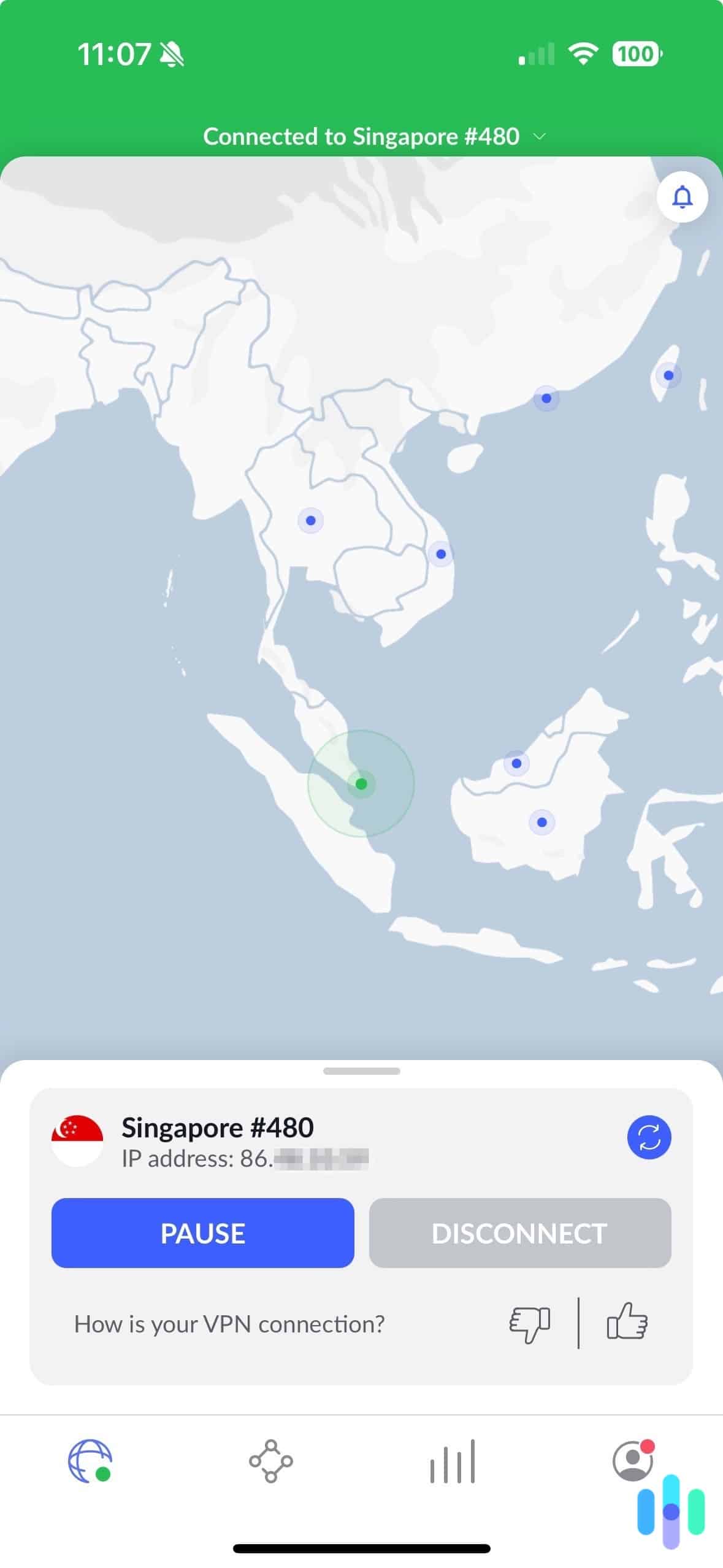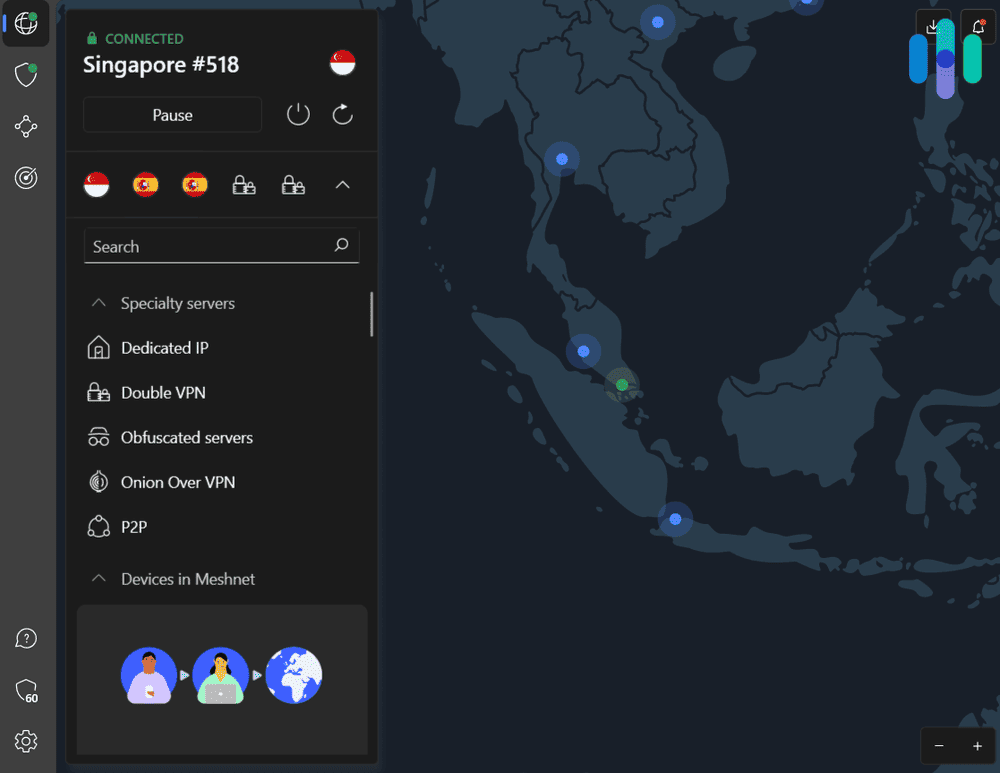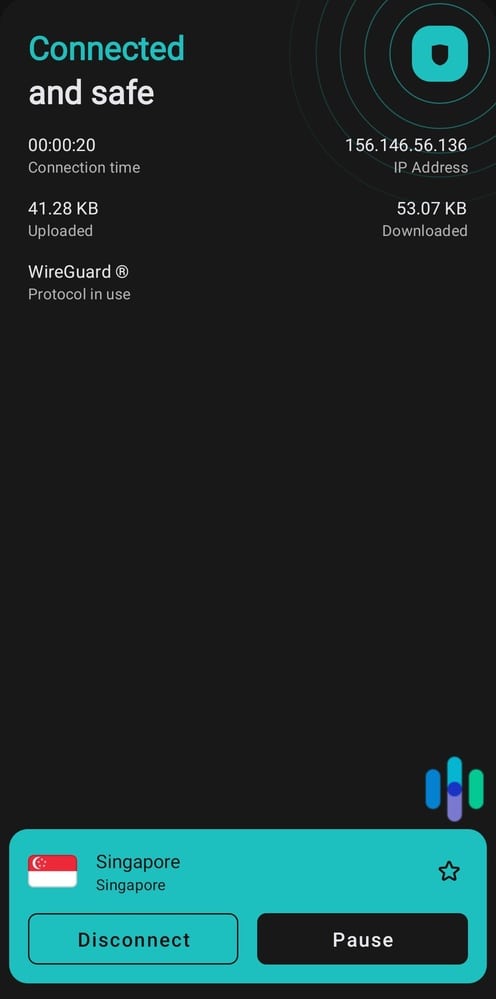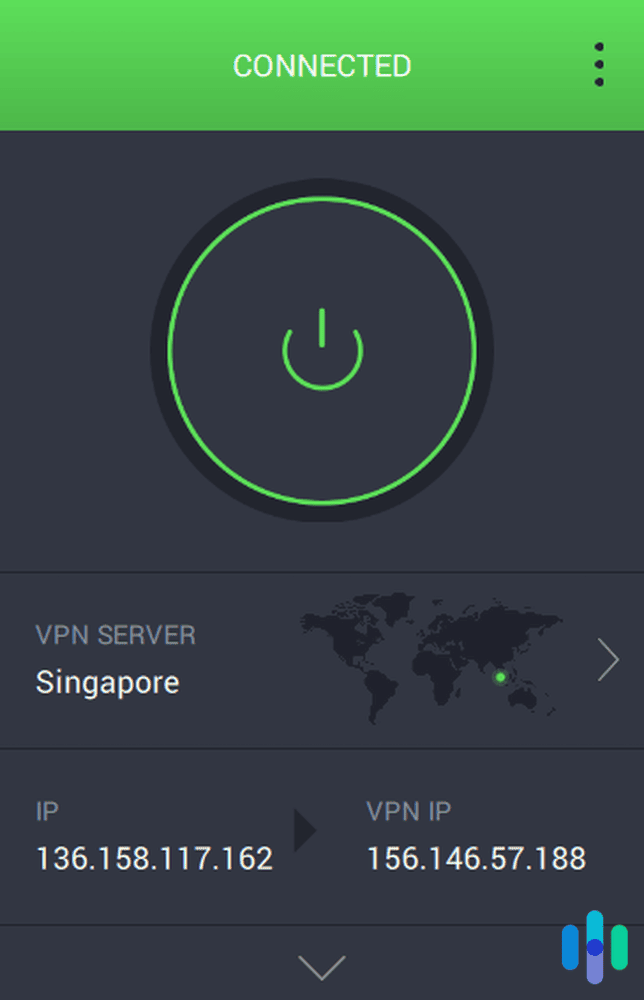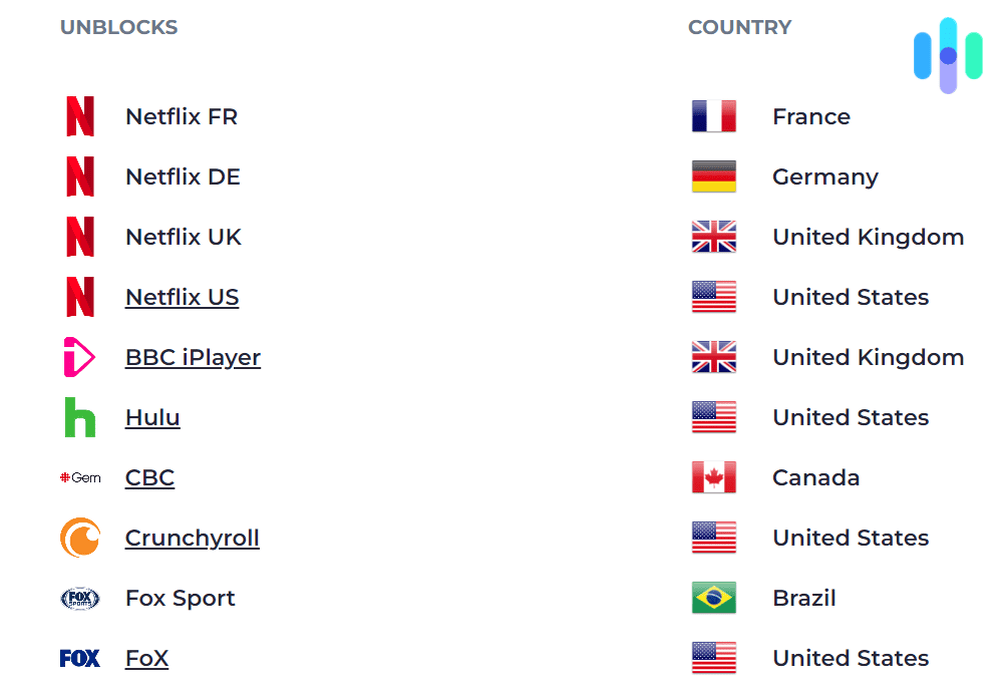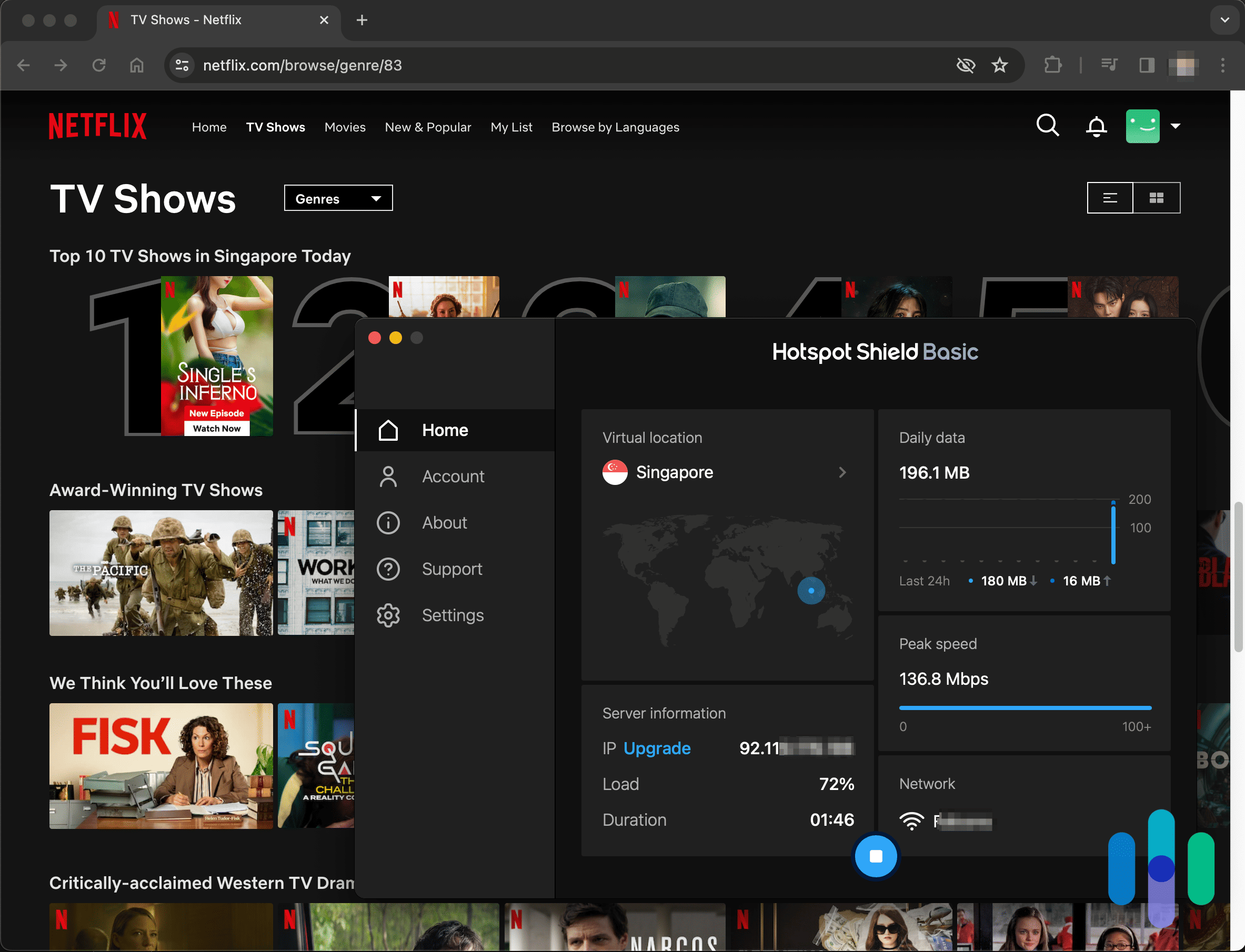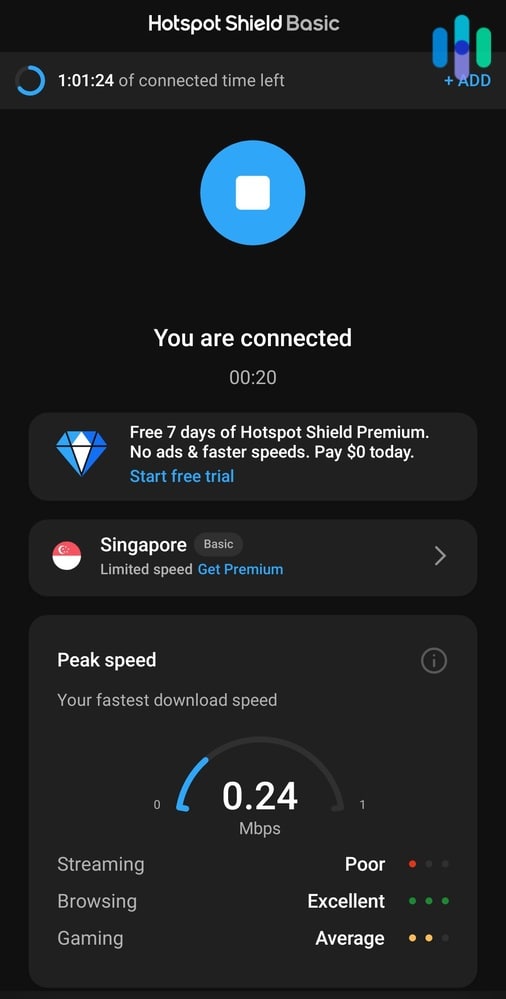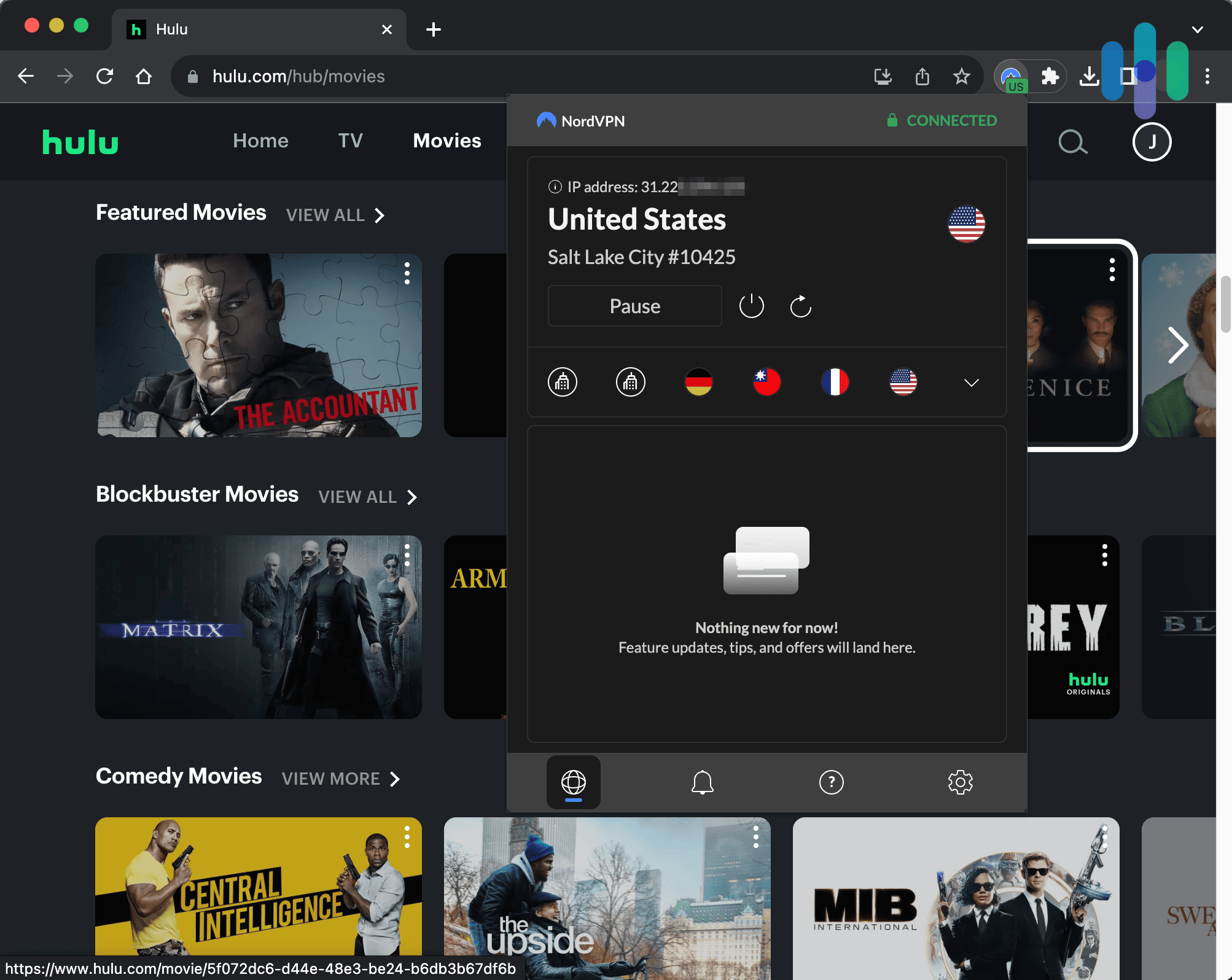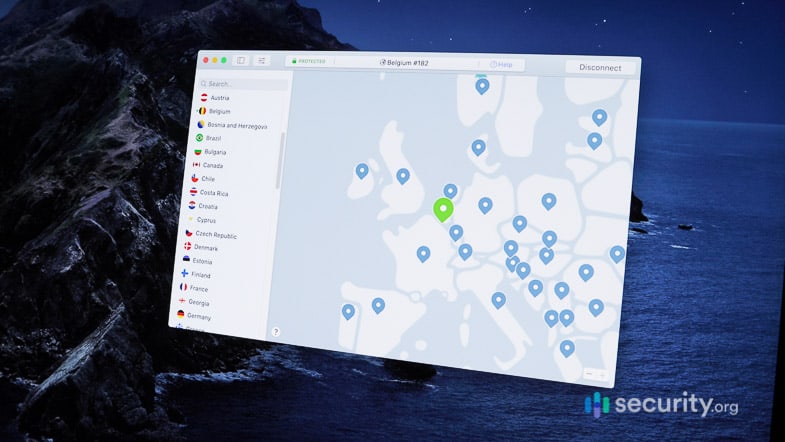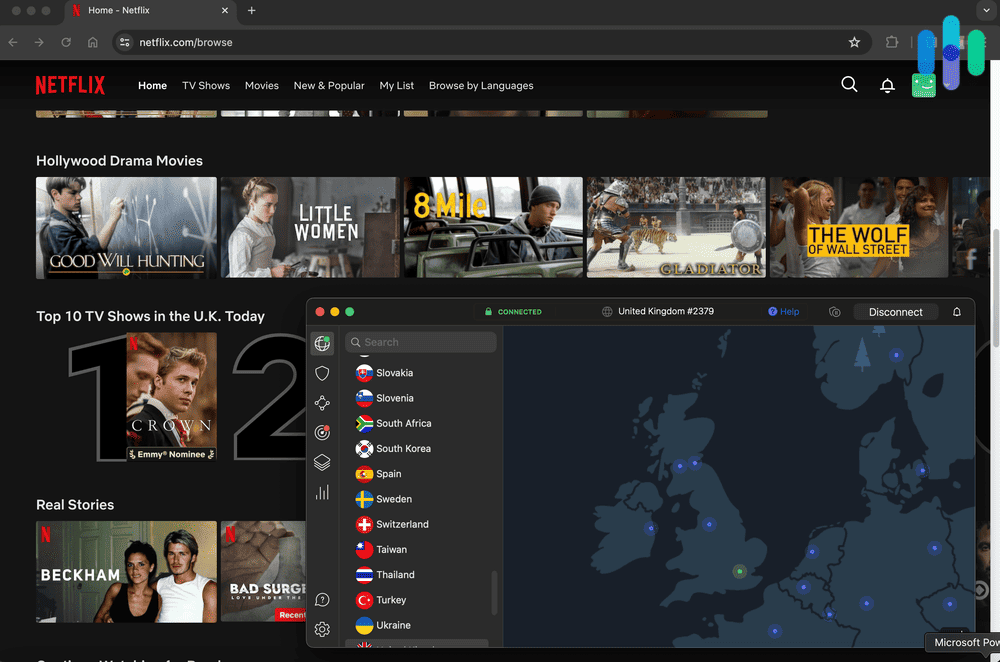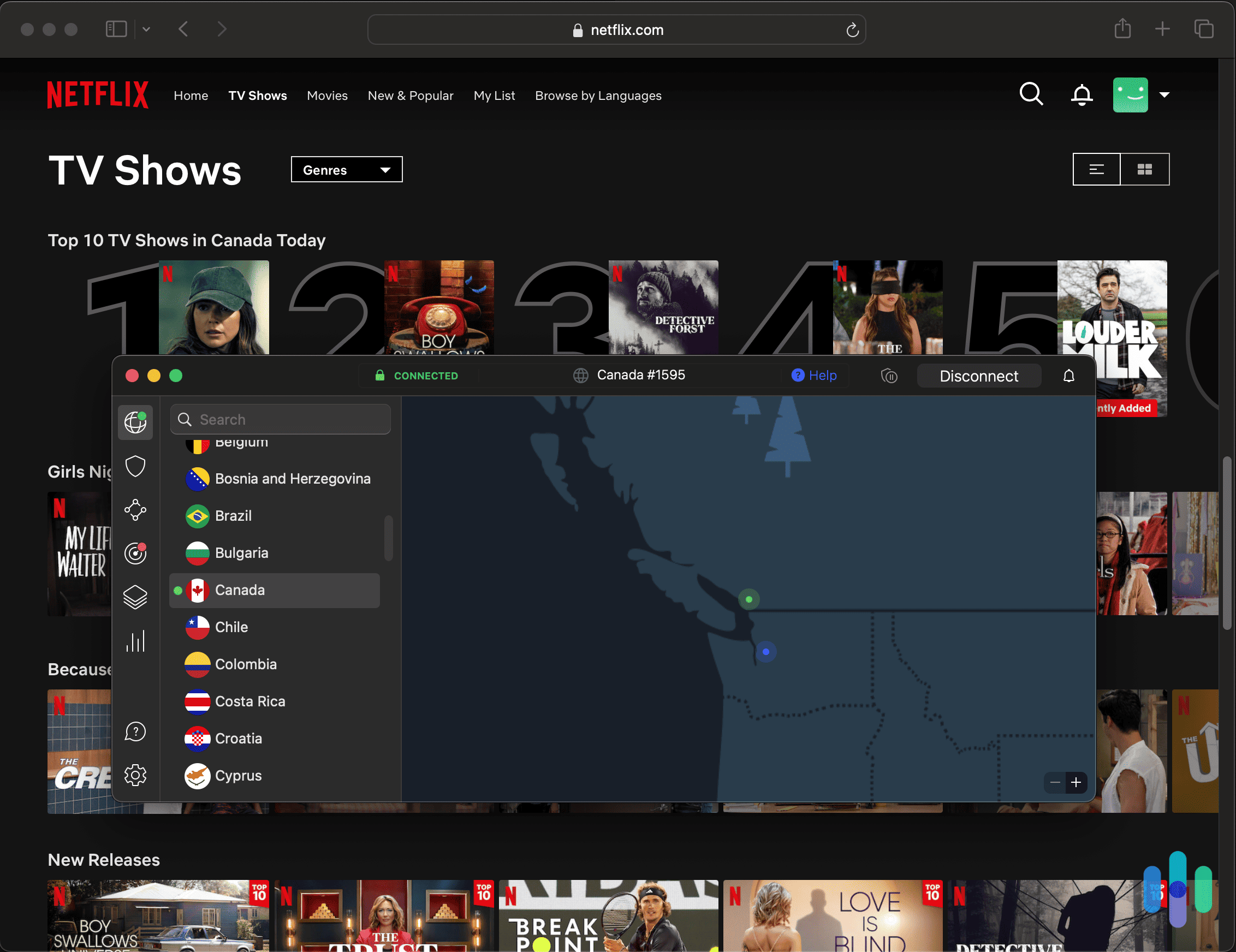The Best VPNs for Singapore 2025
We chose NordVPN as it lets you access blocked content, avoid censored materials, and will never log your online activity. It's a safe bet if you're traveling to Singapore.
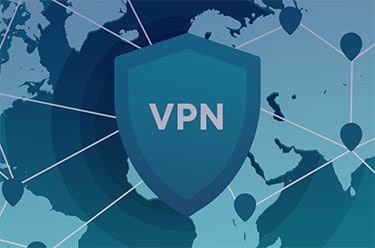

- Access online content the Singapore government has blocked
- Camouflage mode helps you avoid censorship by concealing the fact that you’re using a VPN
- Strict logging policy means the company has nothing to turn over to Singapore authorities, even under subpoena

- Unlimited simultaneous connections mean you can protect all the devices you bring with you to Singapore
- Includes a secure browser for even more protection from government surveillance
- Lets you access Singapore content libraries from other countries, including the U.S.

- AES-256 encryption prevents the Singapore government from tracking your online movements
- Keeps you safe in Singapore even when torrenting
- Provides access to 240 servers in Singapore
Our team recently went backpacking through Asia to test out the best VPNs for travel. The longest stop of the trip was in the sunny city-state of Singapore, where we spent eight days exploring busy shopping districts, spending lazy afternoons in open-air parks, and tasting a wide variety of delectable cuisine from hawker centers.
It was clear to us during our stay that we were in an economically and technologically advanced nation, which is why it came as a huge shock to us when we found out that the Lion City still practices internet censorship.
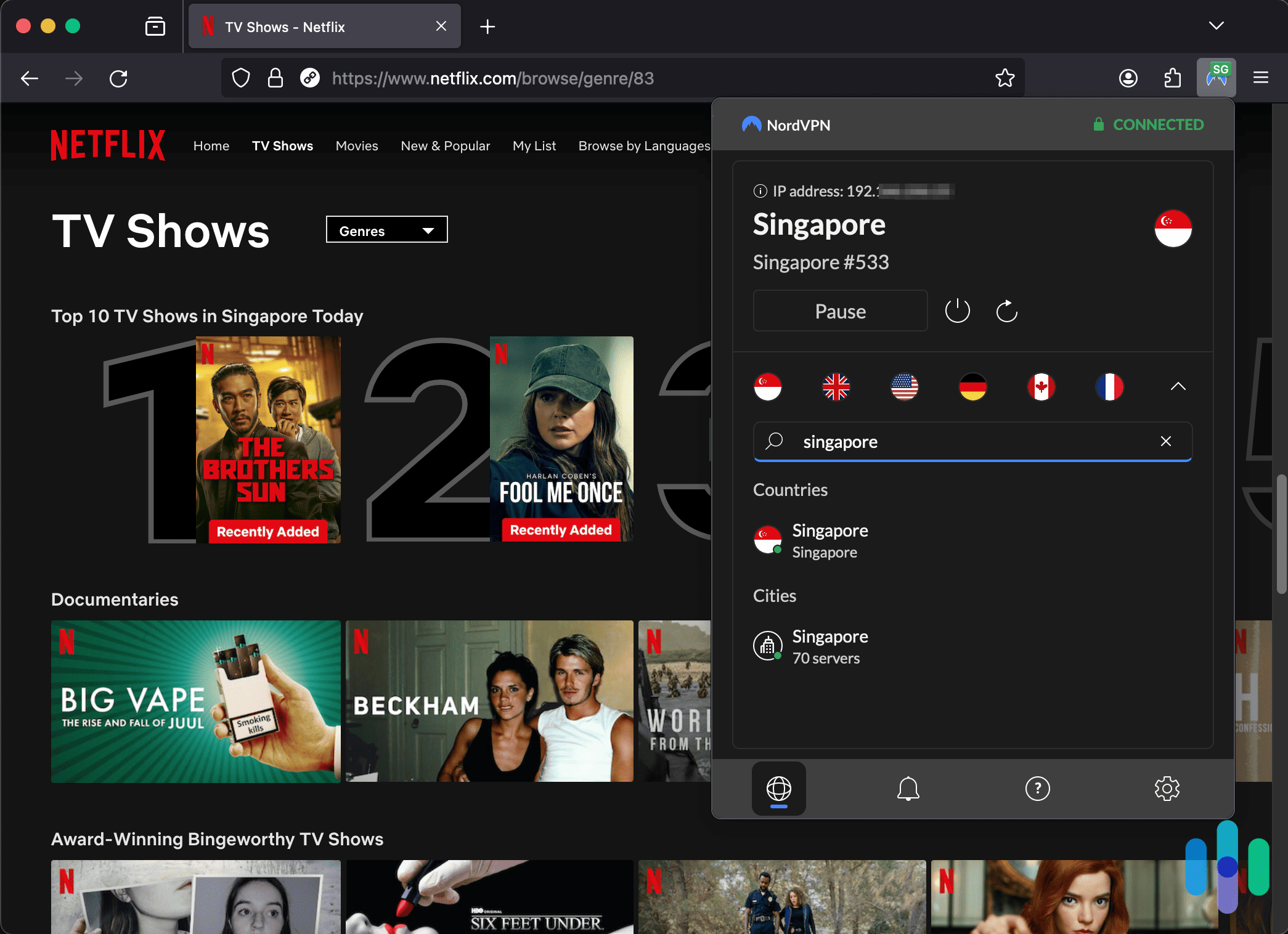
Citing national security concerns and to prevent false information from spreading, Singapore restricts access to any website it sees fit. The city-state’s Infocomm Media Development Authority (IMDA) determines which websites should be blocked, most frequently targeting media libraries, controversial newspapers, and adult content.1
As soon as we learned that, we went full VPN expert mode. We tested VPNs to find out which ones are the best VPNs in Singapore at unblocking websites, giving access to internet freedom, and protecting the privacy of internet users. We shortlisted the top options below.
The Top Singapore VPNs of 2025
- NordVPN - Best for Privacy
- Surfshark - Best for Website Unblocking
- Private Internet Access - Best Affordable Option
- CyberGhost VPN - Best for Streaming
- Hotspot Shield - Best Free Option
The Process: Selecting the Best Singapore VPNs
We were pressed for time; our flight out to China was in six days, so we had to take a shortcut.

We figured that since we’re going to recommend the top VPNs in Singapore anyway, why not start with the ones we already know are cream of the crop? So we started with the 13 VPNs in our roundup of this year’s best VPN options.
We know that all VPNs in that list offer excellent encryption and tunneling. They all use 256-bit AES encryption — the gold standard of VPN encryption — and offer tunneling technology built around either OpenVPN, WireGuard, a self-developed tunneling protocol, or any combination of those three. Personally, we think OpenVPN and WireGuard are the best VPN protocols to use at the moment.
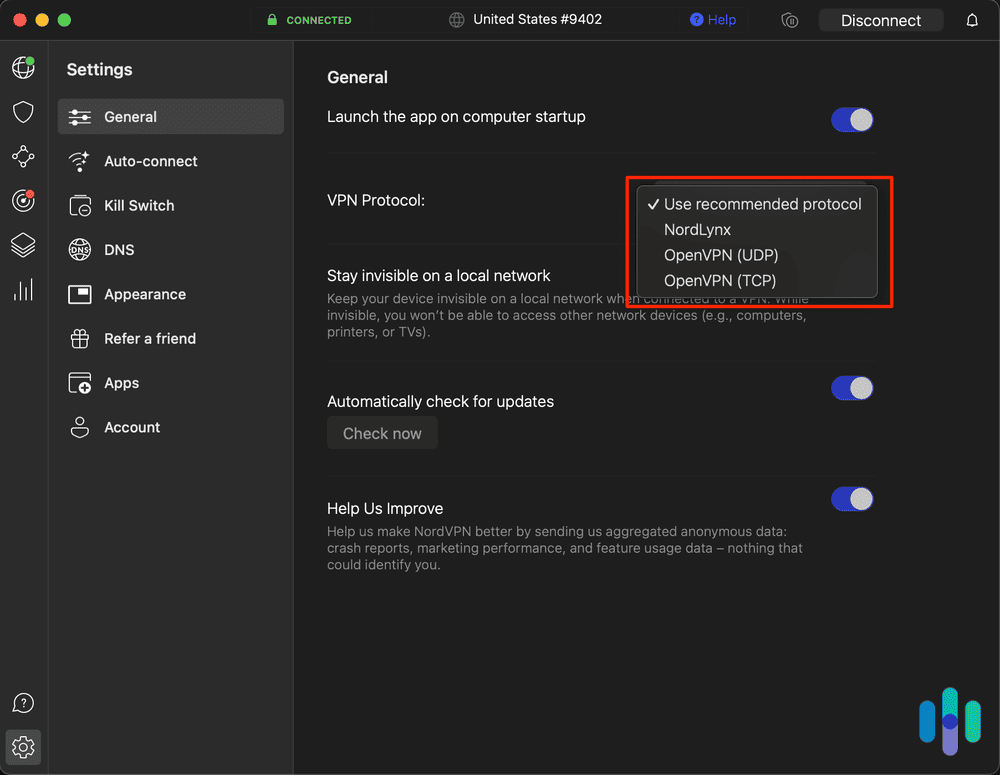
With that out of the way, we focused on performance. Using a VPN in the U.S. is the same as using one everywhere else — except maybe in countries where VPNs are illegal. However, there are some factors that can affect your VPN experience in Singapore, such as proximity to servers and internet speed. To account for those, we tested each of the VPN’s performance and compared them based on these three main criteria:
- Unblocking ability: We found three websites blocked in Singapore that we used for our testing: an online dating service, an Asian geopolitical blog, and a website of a human rights activist group. After verifying that they were indeed blocked in Singapore, we tested if the VPNs could unblock those websites by connecting to a U.S. server to get a U.S. IP address.
- Speed: Next, we tested and tested and compared the speeds of the top VPNs. Fortunately, our hotel provided us with fast, complimentary in-room Wi-Fi, so we were able to compare our baseline speed (without VPN) against VPN speeds.
- Server network: Lastly, we looked at the server network of each option. For this, we wanted to see servers in Singapore and neighboring countries like Malaysia, Indonesia, Cambodia, Vietnam, and Thailand. That way, if you’re trying to access a website blocked in Singapore, you have fast nearby servers to connect to.
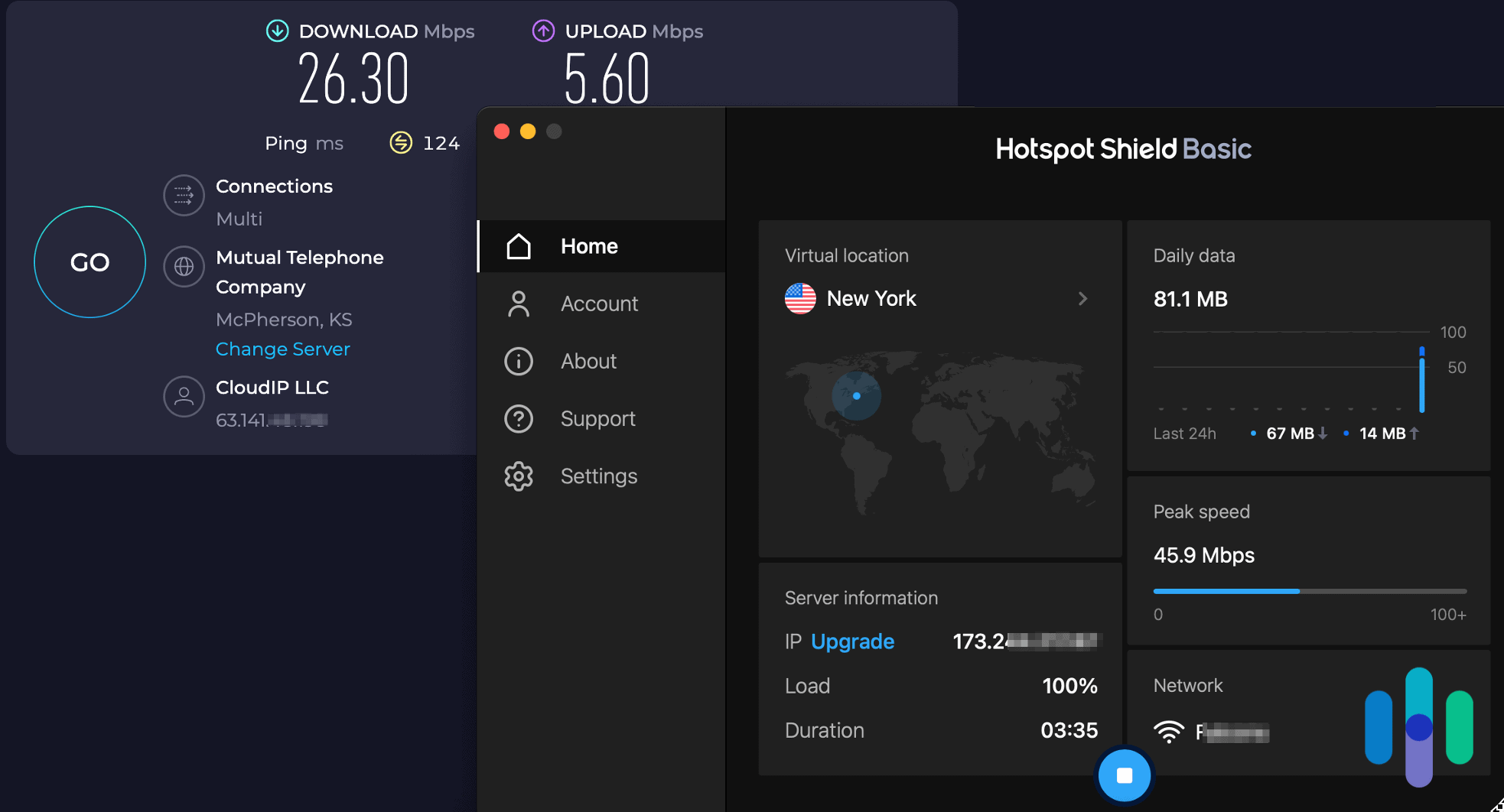
With that, let’s get started with this review of our top-pick VPNs in Singapore.
Specs of The Best Singapore VPNs
| System |
NordVPN

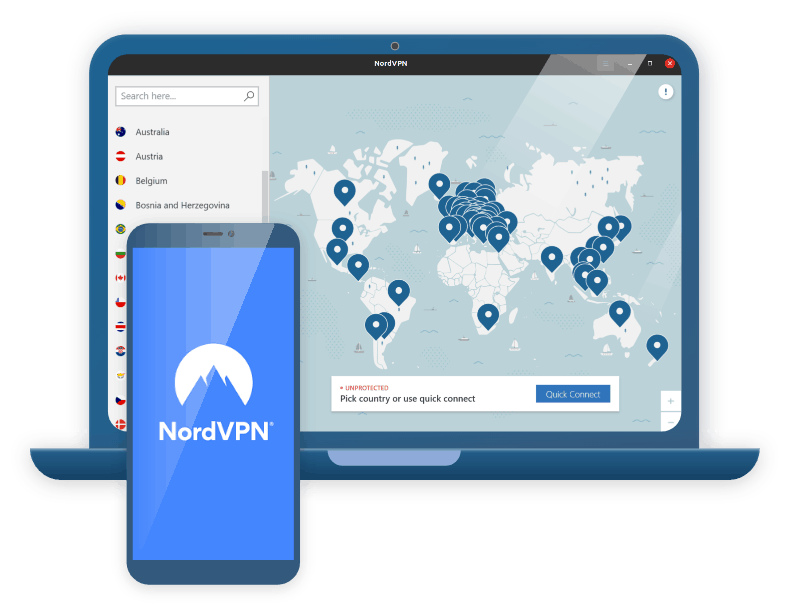
|
Surfshark


|
Private Internet Access

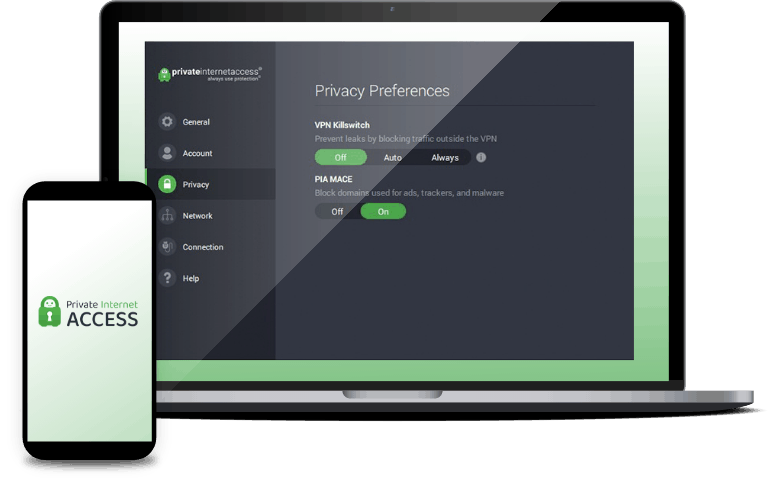
|
CyberGhost VPN

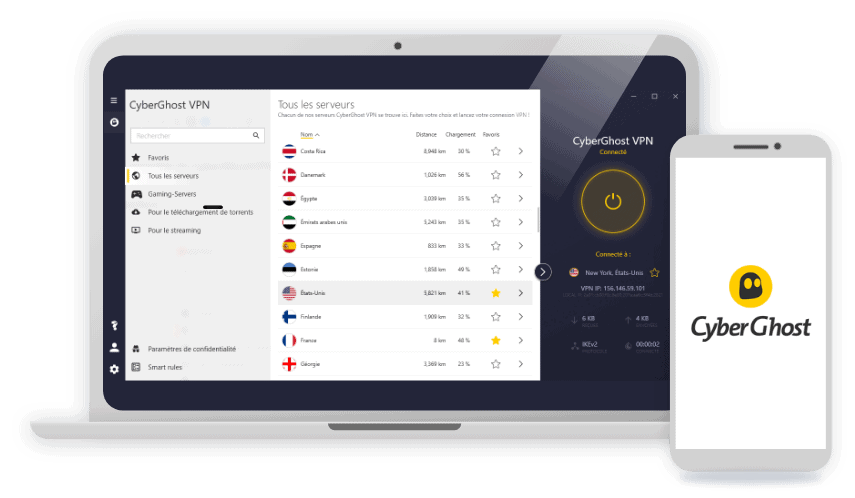
|
Hotspot Shield

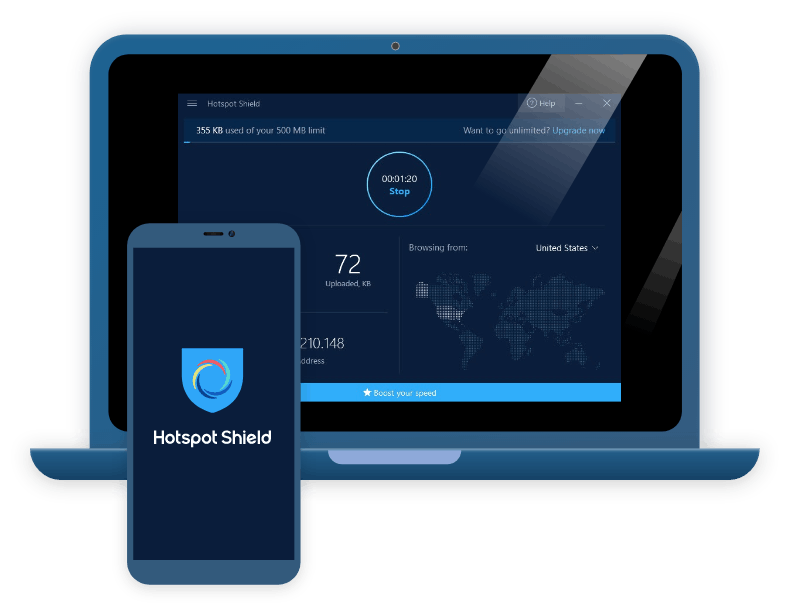
|
|---|---|---|---|---|---|
| Ranking | 1st | 2nd | 3rd | 4th | 5th |
| Ratings | 9.7/10 | 9.5/10 | 9.4/10 | 8.9/10 | 8.9/10 |
| Unblocked websites | 3 of 3 | 3 of 3 | 3 of 3 | 3 of 3 | 3 of 3 |
| Average download speed | 93 Mbps | 89 Mbps | 91 Mbps | 88 Mbps | 88 Mbps |
| Average upload speed | 87 Mbps | 81 Mbps | 79 Mbps | 78 Mbps | 81 Mbps |
| Monthly price (in USD) | $15.99 | $15.45 | $11.95 | $12.99 | $12.99 |
| Best price | $3.09 monthly for 2 years | $2.49 monthly for 2 years | $2.19 monthly for 3 years | $2.29 monthly for 3 years | $7.99 monthly for 1 year |
| Read Review | NordVPN Review | Surfshark Review | Private Internet Access Review | CyberGhost VPN Review | Hotspot Shield Review |
An In-Depth Look at the Best Singapore VPNs
-
1. NordVPN - Best for Privacy
View Plans Links to NordVPNProduct Specs
Multihop Yes Obfuscated Servers Yes Kill Switch Yes Split Tunneling Yes Netflix Yes Torrenting Yes 
Unblocking Ability
Right out the gate, NordVPN was able to unblock the three websites we used for testing. We connected to a U.S. server, which changed our laptop’s location, making it appear as though we were browsing from home.
NordVPN on iOS Connected to a Singapore server More importantly, connecting to NordVPN made our traffic go through a VPN server. That means our hotel’s internet provider had no idea we were connecting to a blocked website. To the ISP, it looked as if we were sending traffic to a server in Miami, while in truth, that server was just an intermediary and it was forwarding our traffic to the blocked websites.
Speed
NordVPN gave us solid speeds. While connecting to a server in the U.S. caused our browsing to slow down quite a bit — we got readings of about 70 Mbps — connecting to nearby servers like the ones in Singapore, Malaysia, and Vietnam yielded an average download speed of 93 Mbps and upload speed of 87 Mbps. We measured our hotel’s internet speed and got about 100 Mbps, so all in all, the speed drop NordVPN caused was well below 15 percent. The industry average, by the way, is 40 percent based on all the other VPNs we’ve tested.
>> Also See: The Fastest VPNs of 2025
Server Network
Singapore is a very small country; it measures less than 290 square miles,2 which is smaller than even Rhode Island. Still, NordVPN has a sizable server network within the city-state. It has over 70 servers in Singapore, not to mention plenty of servers in Malaysia, Indonesia, Vietnam, Thailand, and Hong Kong. While in Singapore, we had no trouble looking for fast servers to use.
>> Further Reading: The Best VPNs in Hong Kong
What We Like
- Fast servers in Singapore and neighboring countries
- Unblocked websites blocked in Singapore
- Strong encryption (256-bit AES) and tunneling (OpenVPN/WireGuard)
- Lightweight VPN protocol called NordLynx
What We Don’t Like
- Slower on U.S. servers when connecting from Singapore
- Slightly laggy apps
- Steeper pricing than other options
- Long queues for live chat support
NordVPN was one of the more expensive VPNs we tested. Our NordVPN subscription would cost us $3.09 per month if we signed up for a two-year plan, compared to Private Internet Access’ best rate of $2.19 per month. As such, we expected nothing less than a high-end experience from NordVPN, and it delivered.
NordVPN connected to Singapore One of our favorite things is how easy it was to use the VPN app. NordVPN promised us strong privacy and security features — from high-level encryption to malware and ad blocking — yet it always took us less than 10 seconds to connect the VPN and enjoy its benefits. There was no special setup required. As soon as we connected to NordVPN, we instantly enjoyed enhanced privacy, access to blocked websites, and countless streaming options.
NordVPN’s app, however, was a little on the laggy side. We didn’t appreciate this when we were exploring, walking from one attraction to the next, or riding the SMRT, because it meant we had to look down at our iPhone a little longer. Thankfully, as we said, we didn’t have to interact much with the app. We connected once at the start of the day, and NordVPN kept our browsing private throughout the rest of it. So overall, it was still a high-end VPN experience.
>> Read About: The Best iPhone VPNs
-
2. Surfshark - Best for Website Unblocking
View Plans Links to SurfsharkProduct Specs
Multi-hop Yes Camouflage Mode Yes Kill switch Yes Split Tunneling Yes Netflix Yes Torrenting Yes 
Unblocking Ability
Much like NordVPN, Surfshark unblocked all three websites without a hitch. In fact, it was a little better at doing so because other than hiding our IP address, it also hid the fact that we were using a VPN through a feature called obfuscation.
Surfshark’s obfuscated servers — aka camouflage mode — made the traffic we were sending to the VPN server look like normal internet traffic. That way, no one would be suspicious that we were accessing blocked websites. Unlike China, Singapore isn’t strict about using VPNs to unblock censored websites, but in case that changes in the future, we recommend Surfshark’s camouflage mode.
>> See Also: Three VPNs That Work in China
Speed
Surfshark’s speed was comparable to NordVPN’s. It was a little slower, averaging 89 Mbps for downloads and 81 Mbps for uploads, but the difference between their speeds was not noticeable at all. We were able to browse like normal and even stream Netflix.
That’s the thing about VPN speeds. They slow down your internet, but you’ll notice it only if your baseline internet speed is also slow. If you live in Singapore, the country with the fastest average internet speeds in the world,3 a drop of a few Mbps will not make a huge impact on your browsing unless you’re doing bandwidth-heavy tasks like online gaming.
Server Network
In total, Surfshark has servers in 100 countries, and that of course, includes Singapore. Surfshark doesn’t say exactly how many servers it has in the garden city, but we saw at least 10 options in the Android and Windows apps. Five of those options had static IP addresses, which means we got the same IP address whenever we connected to them. There’s not much use for static IP addresses, but if you’re like us and need access to a remote server, this might come in handy.
>> Learn More: Static vs. Dynamic IP Addresses
What We Like
- Camouflage mode
- Choice between static and dynamic IP address
- Fast speeds in Singapore and on nearby servers
- Audited “no-logs” privacy policy
What We Don’t Like
- Singapore servers are often crowded
- Records IP addresses of users but deletes them after each session
- Some extra features, like antivirus and Alternative ID, require extra payment
- Expensive monthly plans
Besides being great at getting around censorship, Surfshark provided us with a great user experience. That, to us, was vital, especially since we had a lot of walking and commuting to do in Singapore.
Here’s one example: At the hotel, we connected our phone to a U.S. server to do some online banking before leaving for the Singapore Zoo. We finished our tour around lunchtime and were really craving Hainanese food. We knew we had to connect to a Singapore server to be able to search for nearby restaurants, so we pulled up the Surfshark app and then tapped Singapore from the list of recently used servers. We didn’t even have to look at our phone for more than five seconds to make the switch.
Surfshark Android app connected to Singapore Surfshark is one of the best VPNs for Android because of the app’s performance, and if you value an app that provides a good user experience, Surfshark is definitely one we’d recommend.
On that note, we recommend buying a long-term subscription. Surfshark’s pricing for its month-to-month plans is a tad expensive (starting at $15.45), but the one-year and two-year plans are more affordable. A two-year subscription costs $59.76, which is $2.49 per month on average. That’s over $10 cheaper than the monthly plan!
If you want to pay month-to-month but can’t stomach that $15.45 price tag, NordVPN might be the answer for you. It’s basic plan only costs $12.99 per month, but you don’t get as big of a discount for the yearly or two-year plans. Check out our comparison between NordVPN and SurfShark for a full breakdown.
-
3. Private Internet Access - Best Affordable Option
View Plans Links to Private Internet AccessProduct Specs
Multihop Yes Obfuscated Servers Yes Kill Switch Yes Split Tunneling Yes Netflix Yes Torrenting Yes 
Unblocking Ability
Private Internet Access had no trouble accessing the three blocked websites we used for our tests. We connected to a U.S. server in Miami — the closest U.S. server to Singapore — but even the Malaysia and Indonesia servers worked for that purpose.
We also noticed that even Private Internet Access’ proxy server in the Netherlands was able to unblock the websites. We expected nothing less from one of the best proxy providers. A proxy server, unlike a VPN server, connects you to a different location but without encryption. It changes your IP address but doesn’t protect your privacy; nonetheless, it can circumvent website blocks.
>> Learn More: Proxy vs. VPN: What’s The Difference?
Speed
Private Internet Access is one of the fastest VPNs we’ve ever used. During our tests, it notched a 91 Mbps download speed on the 100 Mbps hotel Wi-Fi network we used. That was a decrease of less than 10 percent, which was impressive.
That said, the upload speed was less than stellar. We recorded a 79 Mbps average, which is still well below the 40 percent average speed loss, but was significantly lower than the download speed we got. If you’re streaming or downloading, Private Internet Access will work just fine. But if you’re uploading videos to YouTube, for example, expect to see slower results.
>> Also See: The Best Youtube TV VPNs
Server Network: Private Internet Access has a deep-reaching network, with thousands of servers in 91 countries. What makes it extra special is that it has servers in each of the 50 U.S. states, making it a great option for Americans living, studying, or working abroad.
While in Singapore, we kept our access to Hulu (a U.S.-only streaming service) by connecting to a server in New York, our home state.
>> Check Out: The Best VPNs for Hulu
What We Like
- Fast for streaming and downloads
- Expansive server network in the U.S.
- Apps with customizable features
- Affordable subscriptions with frequent deals and freebies
What We Don’t Like
- Slower upload speeds
- Not-so-sleek user interface
- Slow email support response times
Private Internet Access is an excellent VPN. Our rating of 9.4 out of 10 is proof of that. However, what stood out the most was Private Internet Access’ affordable pricing. It was the most affordable VPN we tested, yet it offered better features than more expensive options like Atlas VPN and Norton Secure VPN. For example, Private Internet Access had a multihop feature that allowed us to connect subsequently to its proxy server in the Netherlands and then a VPN server of our choice, giving our traffic extra privacy. Neither Atlas nor Norton Secure had such a feature.
>> Read About: Best VPNs in the Netherlands
Private Internet Access connected to Singapore So, how much does Private Internet Access cost? As low as $2.19 per month on average before discounts. The only catch is you’ll have to sign up for three years, so that’s $79 upfront. With NordVPN and Surfshark, the best prices ($3.09 and $2.49, respectively) are for a two-year subscription.
Of course, three years is a long time, but if you’re worried about losing all that money if Private Internet Access doesn’t work out for you, we have good news: There’s a 30-day money-back guarantee. If you don’t like Private Internet Access, you can cancel your VPN subscription within 30 days and get your money back. You can also check out our NordVPN vs Private Internet Access comparison for a deeper dive on their differences.
>> See Also: VPNs With Risk-Free Trials
-
4. CyberGhost VPN - Best for Streaming
View Plans Links to CyberGhost VPNProduct Specs
Multihop Yes Obfuscated Servers No Kill Switch Yes Split Tunneling Yes Netflix Yes Torrenting Yes Unblocking Ability
CyberGhost did well in giving us access to the three blocked websites, but on top of that, it also worked great for accessing streaming services outside of Singapore. While we love the shows on Netflix Singapore, our stay was only eight days, so we didn’t want to start anything we wouldn’t be able to finish. Instead, we used CyberGhost to get a U.S. IP address and watch our favorite Netflix shows back home.
Using a VPN to stream Netflix — or any other streaming site — requires a VPN that’s good at hiding your IP address. That’s exactly what CyberGhost proved to be.
>> Learn More: The Best VPNs for Streaming Netflix
Speed
CyberGhost’s speed was also adequate for streaming. It averaged 88 Mbps, which reflects a 12 percent speed loss. It may not have made our Best VPNs for Streaming list, nor performed as fast as Private Internet Access or NordVPN, but again, those few Mbps differences were barely noticeable. We were still able to stream without buffering, and that’s what’s most important.
Server Network
CyberGhost’s server network was similar to that of Private Internet Access, which isn’t surprising, because both VPN companies are under Kape Technologies. CyberGhost has over 10,000 servers total (and counting) in 100 countries around the world. Twenty-four of those servers are in Singapore, which is a solid number for a city-state of that size.
What We Like
- Fast speeds for streaming
- Excellent unblocking for censored and streaming websites
- Easy-to-use apps
- Affordable prices starting at $2.37 per month
What We Don’t Like
- Small server network in Asia
- Limit of seven connections at a time
- No P2P servers in Singapore
- Occasional trouble connecting to distant servers
If you’re looking to access streaming services or libraries not available in Singapore, CyberGhost is the best VPN for the job. CyberGhost subscriptions cost as low as $2.37 per month if you sign a two-year deal. That’s $56.88 for the whole two years, which isn’t much to add to the rising cost of streaming subscriptions.
Although it’s affordable, CyberGhost has servers optimized for streaming in different locations. Specialty servers like those are often available only from premium VPNs, like NordVPN, with its peer-to-peer (P2P), dedicated IP address, and obfuscated servers. With CyberGhost, we gained access to streaming-optimized servers in France, the Netherlands, the U.S., and the U.K. There were also servers optimized for specific streaming sites, like Crunchyroll and Hulu.
>> Check Out: Our Favorite VPNs in France
CyberGhost streaming-optimized servers and locations Unfortunately, though, if you torrent your movies and TV shows, CyberGhost isn’t the best VPN to use. Singapore is strict when it comes to piracy — as it should be — and CyberGhost doesn’t have peer-to-peer servers (which are VPN servers used for torrenting) located in Singapore. CyberGhost isn’t the best torrenting VPN in Singapore.
>> Learn More: How to Change Location to Access Crunchyroll
-
5. Hotspot Shield - Best Free Option
View Plans Links to Hotspot ShieldProduct Specs
Multi-hop Yes Obfuscated servers Yes Kill switch Yes Split Tunneling Yes Netflix Yes, but not in all regions Torrenting Yes Unblocking Ability
Although it has a premium VPN, we used Hotspot Shield’s free VPN to access blocked websites in Singapore. And yes, even the free VPN worked splendidly. What’s more, we were able to connect to servers in the U.S. and the U.K., so even though it was a free VPN, we still had multiple options.
Hotspot Shield connected to Singapore browsing Netflix Hotspot Shield also worked for streaming. Although some of the U.S. servers were easily detected by Netflix and Disney+, we were eventually able to find a server that can bypass content georestrictions. We were also able to access websites that are blocked in Singapore, like KissAsian (a streaming site with Asian dramas and TV shows blocked on grounds of illegal streaming). While we don’t condone or tolerate piracy, we visited the site just for the sake of checking if Hotspot Shield can unblock it; it can.
>> Read More: The Best VPNs for Disney+ Streaming
Speed
Most free VPNs have speed limiters to get users to buy a premium subscription, but our free Hotspot Shield account offered download and upload speeds at full throttle. Our Singapore connections averaged 88 Mbps for downloads and 81 Mbps for uploads. We had no problem streaming and downloading with those speeds, and as we’ll expand on later, Hotspot Shield is one of our favorite free VPNs because there are no data usage limits either.
Server Network
One of the things that made Hotspot Shield the best free VPN in Singapore was that it had servers right in the country. Typically, free VPNs don’t give users full access to their network. For example, Privado VPN, another free VPN we tested, had free servers in 14 cities, but not in Singapore.
When we tested Hotspot Shield’s free VPN, we gained access to four locations, Los Angeles, New York, London, and Singapore. While the servers around Singapore (Malaysia, Indonesia, etc.) were reserved for premium users, what the free version had was enough to let us access blocked websites in Singapore and at the same time connect us to fast local servers.
What We Like
- Free version has no data or speed limits
- Able to unblock streaming services
- No IP address and browsing activity logging
- Servers in Singapore, the U.S., and the U.K.
What We Don’t Like
- Ads every 15 minutes
- Worked on only one device
- Limited server selection
- Speeds dip during peak hours
There’s not a lot of good free VPNs in Singapore because of its location. Most free VPNs offer servers in the U.S. or in Europe, but very few have servers in Singapore, which is why Hotspot Shield is special.
Hotspot Shield Basic (free) connected to Singapore On top of that, though, Hotspot Shield didn’t have those limits that we normally see from free VPNs. It didn’t have data or speed limits, so we were free to use it for streaming, browsing, and downloading. We didn’t have to worry about our data running out, unlike when we tried TunnelBear, which had an 8 GB monthly data limit. That one was good for a couple of weeks only, and then we had to wait for the next month for the data to refresh.
But you know what they say: there’s no such thing as a free lunch. Hotspot Shield’s free VPN is powered by ads. That’s how the company can afford to keep the basic service free. Each ad gave us 15 minutes of access to a VPN server, which is not bad. When the timer ran out, we simply watched another ad to keep our connection. We could even stock up usage time. At one point, we had watched enough ads to use the VPN for four straight hours.
FYI: The free version also nixes key features, like the kill switch and split tunneling. For those, you’ll have to pay up.
Why VPNs Are Necessary In Singapore
Blocked websites isn’t the only reason why one should use a VPN when in Singapore. It’s also for your safety and privacy.
Free Public Wi-Fi Everywhere
One thing we loved about Singapore was its nationwide internet access. According to Singapore’s official travel guide, Singapore has a 92 percent internet penetration,4 one of the highest in the world. One way tourists and residents can connect to the internet is through public Wi-Fi. And we can personally vouch that Public Wi-Fi networks are everywhere — in malls, public tourist attractions, government buildings, hotels, train stations, etc.
As much as we loved the fact that we could connect to the internet from anywhere, we’re also always wary about connecting to public Wi-Fi networks. Simply put, they are not safe and private. Anyone on the same network as you can see what you’re doing with a little technical know-how.
That’s where VPNs come in. Through encryption, a VPN can scramble your traffic and make sure that even if it’s intercepted, no one else but you and the VPN server can decipher what it contains. Use a VPN whenever connecting to a public network.
>> Also Related: Are Mobile Hotspots Safe?
Scams and Phishing
We were also surprised to find out that scams and phishing make for major headaches for Singaporeans.5 Two days after we arrived, the SIM card we bought at the Changi airport was already receiving scam and phishing texts. Phishing is a type of social engineering scam where a fraudster tries to get information from victims using a fake link.
For example, one of the phishing texts we received read: “We are doing a paid survey about online shopping platforms. Can you assist? Get $15 by answering three simple questions.” After that was a link to an obvious phishing website.
To be clear, VPNs can’t stop users from falling for such scams. If you open a phishing link and enter your personal information, even if you’re connected to a VPN, your identity is compromised. What VPNs can do, however, is encrypt your data, so even if the malicious link contains malware that collects data in the background (without you entering any information), you’re protected.
>> Check Out: Do All VPNs Encrypt Traffic?
Government Spying
This is going to sound controversial, but in our research, we found that the Singapore government might be exercising legal power to obtain personal data from its citizens for surveillance.
The country puts a premium on law and order — sometimes at the expense of online freedom and privacy. In 2013, for example, rumors flew that the Singaporean government was using spyware to surveil internet users, particularly suspected dissidents and activists.6 That was never confirmed, but other cybersecurity experts agree that it’s a possibility.
Whatever the case, it’s best to stay safe from any form of spying — whether by the government or hackers — by using a VPN.
>> Further Info: What to Do If Your Phone Has Been Hacked
Are VPNs Legal in Singapore?
Given that we tested VPNs firsthand in Singapore, we can say that they are in fact legal. We were able to freely download VPN apps, and subscriptions were available for purchase online.
As always, though, we remind everyone that while VPNs are legal in most places, illicit activity, even while veiled by VPN protection, remains illegal.
For example, here are a number of online activities considered illegal in Singapore. Under no circumstances should you do any of these, even if you’re using a VPN:
- Participating in illegal online gambling
- Selling of e-cigarettes or vaping products
- Inciting violence and/or terrorism
- Pimping
- Distributing intimate or voyeuristic images without consent
Conclusion: Using a VPN in Singapore
Setting up and using a VPN is always easy no matter where you are — except in places where VPNs are illegal, of course — but during our limited stay in the Lion City, we loved how extra easy it was to protect our privacy. Internet speeds in Singapore were fast, whether you’re on free public Wi-Fi, mobile data, or hotel Wi-Fi. That means as long as you choose a speedy VPN, which all of our top picks are, you won’t experience slow downloads, laggy online games, or buffering when streaming.
If you’re living in or just transiting through Singapore, take advantage of those fast internet speeds and protect your online privacy with our top VPNs for Singapore.
FAQs
Whether you’re booking a quick trip or planning on spending a few weeks in Singapore, here’s what you need to know.
-
Why do I need a VPN in Singapore?
You need a VPN in Singapore because the government and its corporate partners restrict access to a variety of news, media, and adult content websites, and monitor and track users’ browsing history and data. Furthermore, while the country doesn’t technically fall under Five Eyes jurisdiction, they have a history of cooperating with U.S. surveillance groups.
-
How do I get a VPN in Singapore?
You can get a VPN in Singapore by signing up and paying for a VPN provider that has servers in Singapore or, if you’re a citizen, look for providers that offer servers in countries with fewer internet regulations. After choosing a provider, simply download the app or extension, log into your account, and connect to a server.
-
Are VPNs legal in Singapore?
Yes, VPNs are legal in Singapore as long as you’re not conducting any illegal activity on them. Protecting your browsing history and ensuring privacy is fine, but bypassing copyright laws and committing piracy could land you in legal trouble.
-
What devices do VPNs work on?
Primarily, VPNs work on mobile phones, desktops/laptops, routers, and tablets.
-
What’s the best VPN to use in Singapore?
After extensive research and testing, we found that NordVPN is the best VPN to use in Singapore. If you’re not into NordVPN, SurfShark, PIA, CyberGhost, and Hotspot Shield are great options too.
Infocomm Media Development Authority. (2023). Internet.
imda.gov.sg/regulations-and-licensing-listing/content-standards-and-classification/standards-and-classification/internetSingapore Department of Statistics. (2023). Environment.
singstat.gov.sg/publications/reference/ebook/society/environmentOberlo. (2023). AVERAGE INTERNET SPEED BY COUNTRY AND TERRITORY.
oberlo.com/statistics/average-internet-speed-by-country#Singapore Tourism Board. (2023). Staying Connected in Singapore.
visitsingapore.com/travel-guide-tips/tourist-information/connectivity-wifi-prepaid/Channel News Asia. (2023). More than S$330 million lost to scammers in first half of 2023; cases continue to rise.
channelnewsasia.com/singapore/police-scam-cybercrime-phishing-fake-friend-malware-first-half-2023-3766796The Diplomat. (2013). Online Spying in Singapore?
thediplomat.com/2013/04/online-spying-in-singapore/


